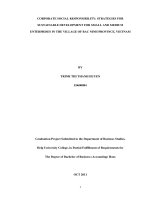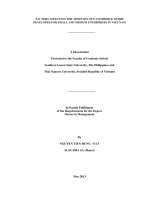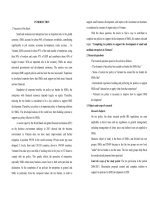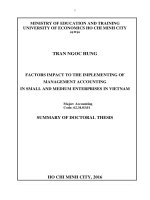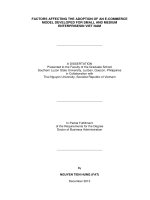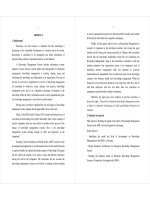The possibility of application DAM-IT material to remediate seepage issues for small and medium reservoirs in Vietnam
Bạn đang xem bản rút gọn của tài liệu. Xem và tải ngay bản đầy đủ của tài liệu tại đây (249.83 KB, 3 trang )
Tuyển tập Hội nghị Khoa học thường niên năm 2018. ISBN: 978-604-82-2548-3
THE POSSIBILITY OF APPLICATION DAM-IT MATERIAL TO
REMEDIATE SEEPAGE ISSUES
FOR SMALL AND MEDIUM RESERVOIRS IN VIETNAM
1
2
2
Nguyen Ha Phuong , Ho Sy Tam , Nguyen Phuong Dung
1
Institute of Civil Engineering, email:
2
Hydraulic Division - Thuyloi University
relief drains can be installed to relieve water
pressure. In this research, DAM-IT material
was studied its ability to limit – without cease –
As reported by Directorate of Water seepage flow by applying in upstream face of
Resources (2012), there are about 6886 dams embankment dam. For small and medium
in Vietnam, in which over 90% is earthen reservoirs [2] it is essential to promptly handle
dam [1] – nearly 1200/6886 needs to seepage issues while ensuring rational total
remediate without delay. Although, these investment – DAM-IT material could meet
earthen dams have been played an important these requirements. Technical characteristics of
role in ensuring water resource security, they DAM-IT material are discussed below.
also have been revealed many risks for the
downstream due to dam safety issues, 2. INTRODUCTION AND MECHANISM
especially the seepage problems.
OF DAM-IT MATERIAL
Seepage is the continuous movement of
In order to withstand with the challenge of
water from the upstream face of the dam
toward its downstream face. Seepage can climate change as well as other random
emerge anywhere on the downstream face, events and to ensure the safety of people's
beyond the toe. Its appearances could range lives and downstream property, solving
from a "soft" wet area to a flowing "spring". It safety problem and handling of dam incidents
may show up first as an area where the are extremely urgent. Due to the time limit
vegetation is lush and darker green. Seepage for research, this research is mainly focusing
can also saturate and weaken portions of the on the seepage issues of the dam and the
embankment and foundation, making the ability of applying Dam-IT material in the
embankment susceptible to earth slides. If the conditions of Vietnam. Dam sealer is a new
seepage forces are large enough, soil could be and very effective material in reducing the
eroded from the foundation and be deposited in leak volume and hence diminishing the
seepage forces in dam’s body, consequently
the shape of a cone around the outlet.
The need for seepage control will depend increasing the safety of the dam.
on the quantity, content, and location of the
Figure 1.
seepage. If the seepage has lowered the
The material
reservoir water level or endanger the dam or
expanded its
appurtenant structures, it is time to take
size and
action over seepage issues although reducing
the quantity of seepage that occurs after
floated in the
construction is difficult and expensive.
water
Typical methods used to control the quantity
of seepage are grouting or installation of an
Shalex indus tries is a specialist manufacturer
upstream blanket; in addition weep holes and of clear sealers and waterproofing compounds
1. APPROACH TO SEEPAGE ISSUES FOR
SMALL AND MEDIUM RESERVOIRS
595
Tuyển tập Hội nghị Khoa học thường niên năm 2017. ISBN: 978-604-82-2548-3
that include Dam-IT (or Dam sealer) material to
prevent seepage for dams and ponds [3]. The
Dam Sealer was applied in physical models to
evaluate the total reduction volume and from this
point of view the effectiveness of Dam Sealer
was estimated. Dam-IT is designed with a
pos itive charge that pulls it down under the water
toward the bottom of the dam or pond.
with upstream slope m1 =2 and downstream
slope m2 =1,8. The water column at upstream
site was 0,4m compared with the foundation of
the dam; the tail water level was controlled at
0,08m. The upstream head was refilled to reach
the value of 0,4m after 24 hours. Behind the
mica plate was a collecting part to measure the
seepage volume to the downstream site. The
design dam model was illustrated in figure 2
and figure 3.
Figure 2. Dimension of the model
Figure 3. Physical model
The water pres sure (hydrostatic pressure),
which causes the dam or pond to leak, forces
the polymer down into cracks and crevices as it
sinks to the bottom of the pond or dam. Once
activated with water, the polymer will expand
in size and bind to other polymer particles to
form larger groups of particles, which
effectively slows and stops the leak. The
polymer will continue to expand over s everal
hours and forms a flexible plug that withstands
water pres sure. The positive charge of the
particles will also attract any silt and
sus pended matter in the water downward to the
bottom, which acts to embed the polymer
within the soil structure and minimize any
disturbance or movement of the polymer that
may be caused by future water inflows. By
attracting the small particle and soil particle in
the water body, Dam Sealer creates a new
cover layer on the top of upstream surface and
then reduce the seepage volume.
3. PHYSICAL MODEL AND RESULTS
The model was compacted using soil sample
with identified mechanical properties as following:
W op t based on TCVN 4201:2012 (W op t =14,52%
and γ=1,89g/cm3, respectively); =31,25o, C=7,95
kN/m2 based on TCVN 4199 : 1995; and
K= 6,04e-6 cm/s based on TCVN 8723 : 2012.
After constructing physical model and
filling water, seepage volume was measured
until it reached stable. There were 2 cases to
carry out experiment: before using Dam-IT
material (table 1) and after applying it (table 2),
each case was operated in 2 weeks. The
Dam-IT was mixed with soil sample in order
to increase its efficiency and accelerate the
settle speed. In the research, the ratio 3% was
chosen (30g Dam Sealer/ 1000g soil sample).
The time between each measurement period
was 24h, 18h, 12h.
Table 1. Diary recording before applying
the material
Time
UH* DH** Dam(cm) (cm)
age
3p.m (9/2)33
3p.m(10/2)
3h30p.m(10/2)- 35
3h30p.m(11/2)
4p.m(11/2)33,5
4p.m(12/2)
4h30p.m(13/2)- 34
4h30p.m(14/2)
5p.m(14/2)33
5p.m(15/2)
Average
Q(m3/s)
27
6
3,13E-07
28,5
6,5
3,30E-07
27,5
6
3,18E-07
27
7
3,13E-07
27,5
5,5
3,18E-07
3,18E-07
The total height of the model was 1,1m with
UH* - Upstream hydraulic Head; DH** 0,1m for the foundation made of mortal and
1m heigh for retaining water and soil. The total Downstream hydraulic Head.
The particular picture used for illustrating
length was 2,5m and the designed width was
0,8m. The height of the dam model was 0,5m the water level at upstream site and
596
Tuyển tập Hội nghị Khoa học thường niên năm 2018. ISBN: 978-604-82-2548-3
downstream site in a particular day because 4. CONCLUSION
the phreatic line was stable and the filling
As Dam-IT has some effects on reducing
volume of water didn’t change much in the seepage flow, therefore it is satisfactory to
period of 2 weeks.
remediate earthen dam. The result ranges in
broad spectrum because applying Dam-IT
depends on sample soil layer and its
mechanism in different inclined planes on
upstream slope.
Since Dam-IT is a new and effective
material, further research is needed so that
user can deeply understand how to use this
material efficiently.
Several properties and application should be
known, such as the best ratio between soil and
Figure 4. The water level at upstream site Dam-IT material, the lifespan of the material
after 24 hours of observation (10/2-11/2)
and other methods of applying this material, the
In the physical model, the Dam Sealer construction techniques for it and also the
layer was settled down under the forces ability of applying it on larger scale.
The impact of Dam-IT on the environment
exerted by the water, besides that the
concentration of Dam Sealer material was also needs further research although from data of
distributed non-uniformly, so this could Shalex company and in our research have
reduce the effect of material. Dam-IT could observed that it does not harm to the environment.
Another approach of research on this
reduce seepage volume in physical model
material is the optimal concentration of Dam
after 2-day of application.
Sealer for reducing the seepage volume. With
Table 2. Diary recording after applying the the dam model, the effectiveness of Dam
DAMIT material
Sealer is recommended as about 20% or
higher. When applying for the real dam, the
UH
DH Dama
3
Time
Q(m
/s)
turbidity of river can increase the efficiency
(cm) (cm) ge
like the mechanism that have been discussing
12p.m(22/2)7
5,5
1,5 2,55e-07
above. For embankment dam in Viet Nam, its
6p.m(22/2)
mechanism can be very effective on reducing
6h30p.m(22/2)24
17,5
6,5
2,70e-07
12h30p.m(23/2)
the seepage volume in both dam body and
foundation.
However, the method of
12h30p.m(23/2)- 27
21,5 5,5 2,59e-07
11h30a.m(24/2)
applying still needs further research to
identify the best construction and application
12hp.m(24/2)5
4
1
2,47e-07
4h30p.m(24/2)
method of this material in Vietnam.
5p.m(24/2)3p.m(25/2)
Average
25.5
20
5,5
2,53e-07
REFERENCES
2,57e-07
[1] Report of Directorate of Water Resources,
2012.
Values of discharge through dam’s body
decreased more than 19,2% before and after [2] QCVN 04-05:2012.
[3] />applying DAM-IT material (on average results
[4] TCVN 4201:2012; TCVN 4199:1995;
from table 1 and table 2). It deserves the
TCVN 8723:2012.
effective of Dam Sealer on this physical model.
597
